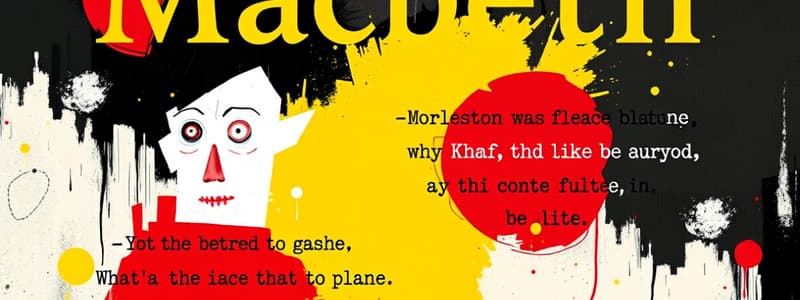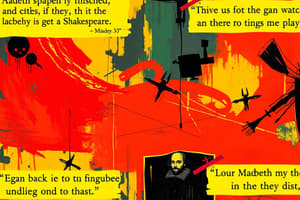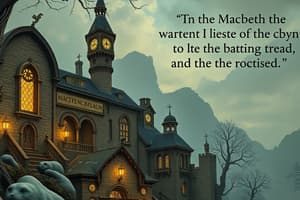Podcast
Questions and Answers
What does the quote "Fair is foul, and foul is fair" primarily highlight in the play?
What does the quote "Fair is foul, and foul is fair" primarily highlight in the play?
- The contrast between reality and appearance (correct)
- The importance of loyalty
- The struggle between good and evil
- The inevitability of fate
What does Macbeth's hallucination of the dagger symbolize?
What does Macbeth's hallucination of the dagger symbolize?
- His fear of the supernatural
- His growing madness and ambition (correct)
- His loyalty to Duncan
- His courage to commit murder
How does Lady Macbeth's line "Out, damned spot! Out, I say!" reflect her character development?
How does Lady Macbeth's line "Out, damned spot! Out, I say!" reflect her character development?
- It reveals her deep guilt and descent into madness (correct)
- It indicates her resentment towards Macbeth
- It signifies her acceptance of fate
- It shows her power and control
What theme does Macbeth's soliloquy, "Tomorrow, and tomorrow, and tomorrow," express?
What theme does Macbeth's soliloquy, "Tomorrow, and tomorrow, and tomorrow," express?
What is the significance of the dagger in Act 2, Scene 1?
What is the significance of the dagger in Act 2, Scene 1?
How does the phrase "petty pace" in Macbeth's soliloquy reflect his perception of life?
How does the phrase "petty pace" in Macbeth's soliloquy reflect his perception of life?
Which character's psychological state is primarily examined through their actions and words regarding guilt?
Which character's psychological state is primarily examined through their actions and words regarding guilt?
What does Lady Macbeth’s command to wash away imaginary bloodstains reveal about her character?
What does Lady Macbeth’s command to wash away imaginary bloodstains reveal about her character?
Which theme is established by the witches' statement 'Fair is foul, and foul is fair'?
Which theme is established by the witches' statement 'Fair is foul, and foul is fair'?
What psychological state does Macbeth exhibit as he contemplates the dagger?
What psychological state does Macbeth exhibit as he contemplates the dagger?
How does Lady Macbeth's exclamation 'Out, damned spot! Out, I say!' symbolize her character's journey?
How does Lady Macbeth's exclamation 'Out, damned spot! Out, I say!' symbolize her character's journey?
What does Macbeth's reflection on time in 'Tomorrow, and tomorrow, and tomorrow' suggest about his outlook on life?
What does Macbeth's reflection on time in 'Tomorrow, and tomorrow, and tomorrow' suggest about his outlook on life?
What aspect of Lady Macbeth’s character is highlighted through her inability to wash away the imaginary bloodstains?
What aspect of Lady Macbeth’s character is highlighted through her inability to wash away the imaginary bloodstains?
Which element of the supernatural is suggested by Macbeth’s hallucination of the dagger?
Which element of the supernatural is suggested by Macbeth’s hallucination of the dagger?
In what way does the statement 'fair is foul, and foul is fair' foreshadow character behaviors throughout the play?
In what way does the statement 'fair is foul, and foul is fair' foreshadow character behaviors throughout the play?
What does the repetition of the phrase 'Tomorrow, and tomorrow, and tomorrow' reveal about Macbeth's life perception?
What does the repetition of the phrase 'Tomorrow, and tomorrow, and tomorrow' reveal about Macbeth's life perception?
What does the phrase 'Out, damned spot!' primarily signify about Lady Macbeth's psychological state?
What does the phrase 'Out, damned spot!' primarily signify about Lady Macbeth's psychological state?
How does the statement 'Fair is foul, and foul is fair' relate to the overall theme of the play?
How does the statement 'Fair is foul, and foul is fair' relate to the overall theme of the play?
In Macbeth's soliloquy 'Tomorrow, and tomorrow, and tomorrow,' what existential theme is portrayed?
In Macbeth's soliloquy 'Tomorrow, and tomorrow, and tomorrow,' what existential theme is portrayed?
What does Macbeth's hallucination of the dagger suggest about his mental state?
What does Macbeth's hallucination of the dagger suggest about his mental state?
How does Lady Macbeth's earlier ambition contrast with her later actions in the play?
How does Lady Macbeth's earlier ambition contrast with her later actions in the play?
What role does the supernatural play in Macbeth's decision-making throughout the play?
What role does the supernatural play in Macbeth's decision-making throughout the play?
What does the imagery of blood in Lady Macbeth's actions signify?
What does the imagery of blood in Lady Macbeth's actions signify?
In what way does Macbeth's reflection on time in 'Tomorrow, and tomorrow, and tomorrow' express his character's journey?
In what way does Macbeth's reflection on time in 'Tomorrow, and tomorrow, and tomorrow' express his character's journey?
What theme is predominantly illustrated by the line 'Out, damned spot! Out, I say!'?
What theme is predominantly illustrated by the line 'Out, damned spot! Out, I say!'?
How does the quote 'Tomorrow, and tomorrow, and tomorrow' reflect Macbeth's view on time?
How does the quote 'Tomorrow, and tomorrow, and tomorrow' reflect Macbeth's view on time?
What does Macbeth's hallucination of the dagger reveal about his character at that moment?
What does Macbeth's hallucination of the dagger reveal about his character at that moment?
In the line 'Fair is foul, and foul is fair,' what underlying idea is presented?
In the line 'Fair is foul, and foul is fair,' what underlying idea is presented?
What aspect of Lady Macbeth's character is highlighted through her sleepwalking scene?
What aspect of Lady Macbeth's character is highlighted through her sleepwalking scene?
What does Macbeth's reflection on the dagger symbolize in terms of his character development?
What does Macbeth's reflection on the dagger symbolize in terms of his character development?
What does the repetition of 'Tomorrow, and tomorrow, and tomorrow' suggest about Macbeth's life?
What does the repetition of 'Tomorrow, and tomorrow, and tomorrow' suggest about Macbeth's life?
How does the quote 'Out, damned spot!' relate to Lady Macbeth's earlier characterization?
How does the quote 'Out, damned spot!' relate to Lady Macbeth's earlier characterization?




